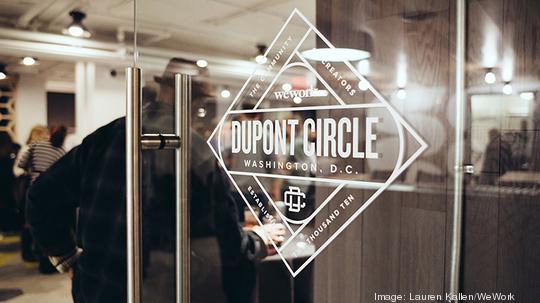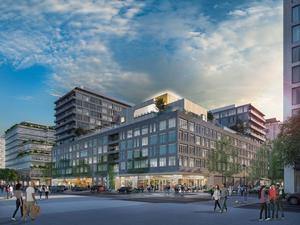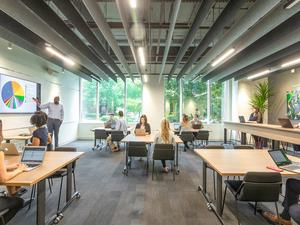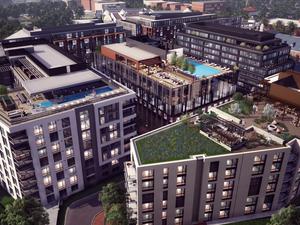
WeWork Inc. is looking to entice small businesses and startups into its Greater Washington offices in a big way.
The coworking chain (NYSE: WE) is committing $16.3 million in rent subsidies as part of its WeWork Growth Campus program. That project is an effort to refill its spaces, especially with companies formed during Covid-19 or just before.
"This is one of the ways we can work with D.C. to foster economic recovery and help these startups go to work, some of them for the first time," said Chris Ferzli, head of WeWork's city partnerships program.
The WeWork Growth Campus program launched in New York City in February and spurred 200 applications. Off of that success, the company is putting $60 million into expanding the program into D.C., Boston, Chicago and Los Angeles, with the largest share of that investment flowing to the District.
Companies must commit to a six or 12-month lease in one of four WeWork D.C.-area locations — Metropolitan Square at 655 15th St. NW, the program's hub, 1775 Tysons Blvd., 200 Massachusetts Ave. NW and Midtown Center — between now and the end of August, according to the terms and conditions. The company is setting aside up to 290 workspaces across its local footprint to be subsidized under this plan. Businesses have to be based in D.C., founded in the last five years, have under 100 employees, and be pre-revenue or under $2 million a year.
The project is a benefit both to WeWork — which reported an $803 million net loss in the last quarter of 2021 as occupancy ticked up to 63%, and D.C.'s office market, where vacancy rates sit at historic highs as traditional commuters continue to work from home. WeWork's Greater Washington presence includes 13 locations, pared down from 21 as a result of the company's financial struggles and the pandemic's impact
The D.C. area is fertile ground for new businesses, Ferzli said, and while it real estate market is especially vulnerable to companies forgoing real estate entirely for remote work.
"D.C. specifically has a lot of companies that have begun during the pandemic and a lot of technology companies spread across a lot of different sectors," Ferzli said. "That creates a lot of opportunities for a collaborative environment that's unique to other cities in the country."
WeWork has also partnered with the District government to offer reduced rates on spaces and memberships for companies relocating, returning, or expanding in the city. The Bowser administration wants to support more startup activity for companies in the federal contracting, education and health care sectors, or "Feds, Eds and Meds," said John Falcicchio, D.C.'s deputy mayor for planning and economic development.
"One of the ways that we’ll come back is attracting and supporting more tech entrepreneurs to collaborate together again," Falcicchio said.


